Unit 4 My day Gramma 课件(25张PPT)
文档属性
| 名称 | Unit 4 My day Gramma 课件(25张PPT) | 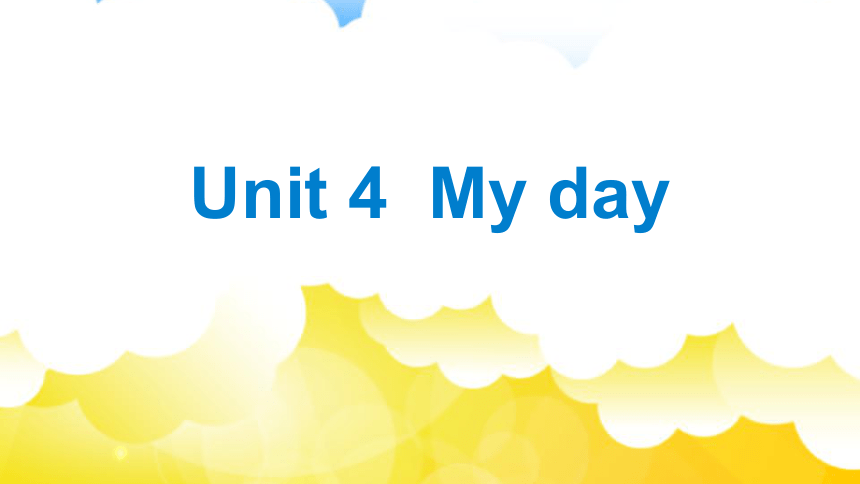 | |
| 格式 | zip | ||
| 文件大小 | 17.6MB | ||
| 资源类型 | 教案 | ||
| 版本资源 | 牛津译林版 | ||
| 科目 | 英语 | ||
| 更新时间 | 2018-10-19 14:28:45 | ||
图片预览


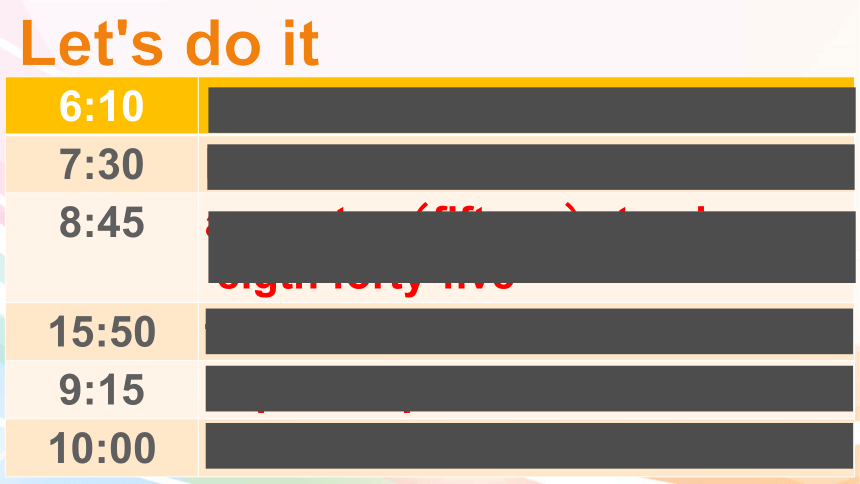
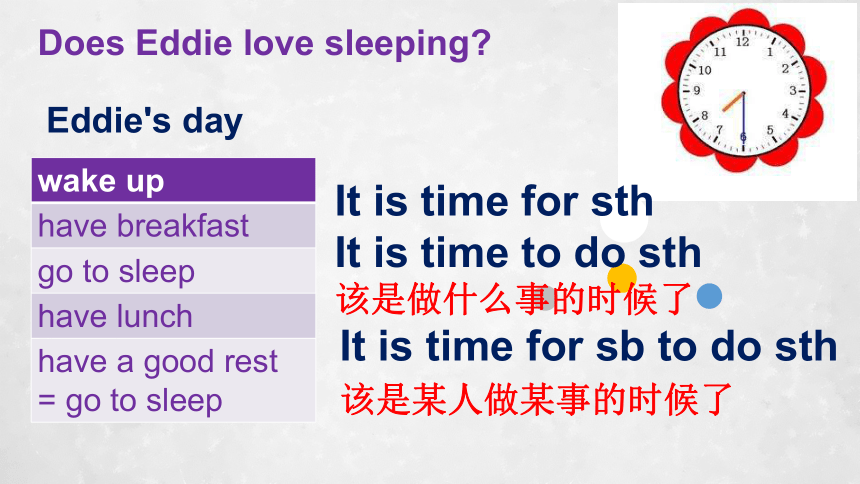
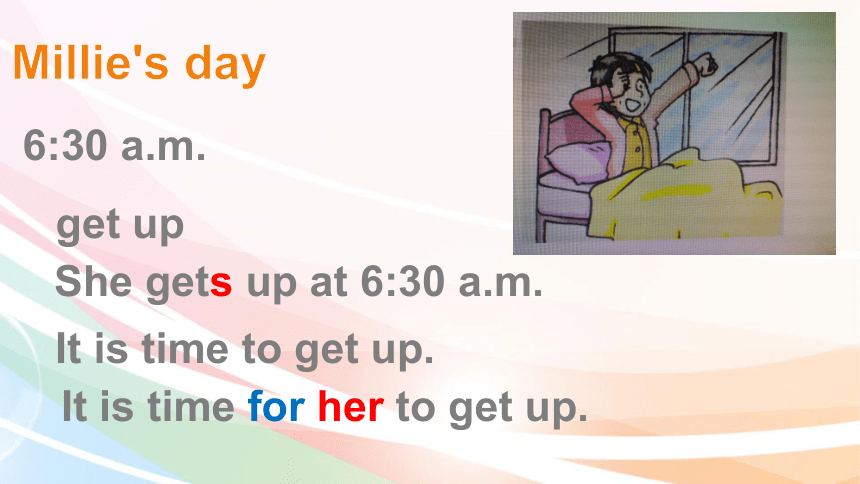
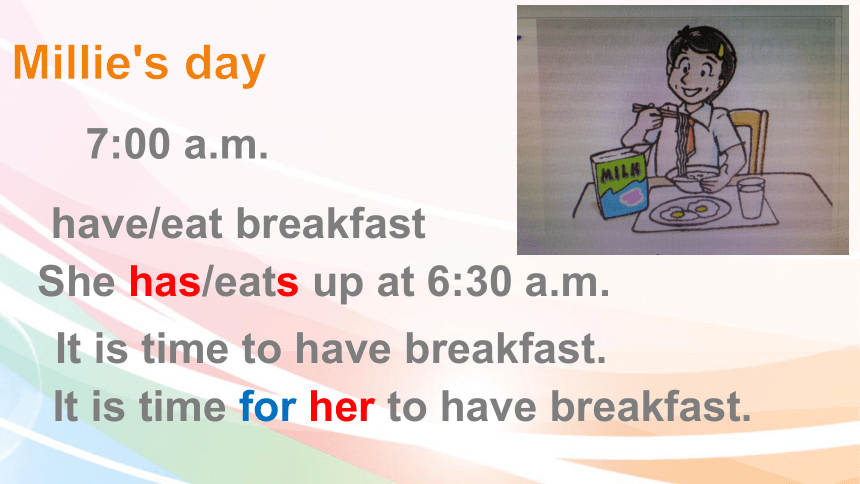
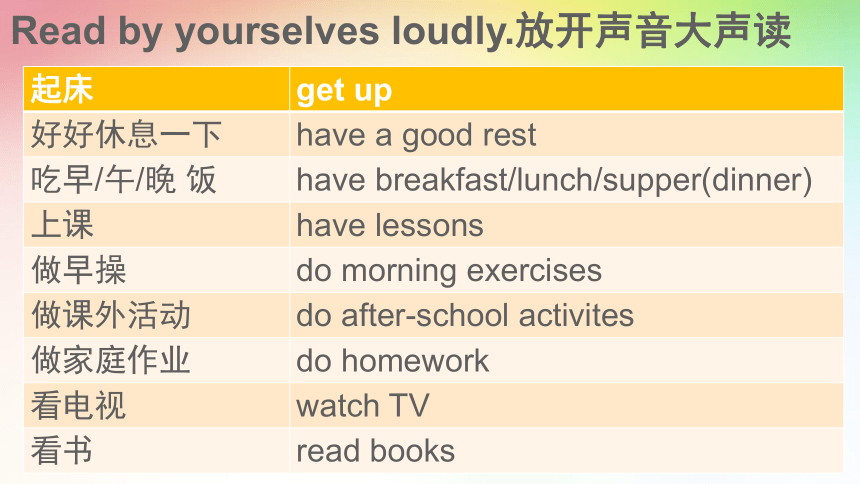
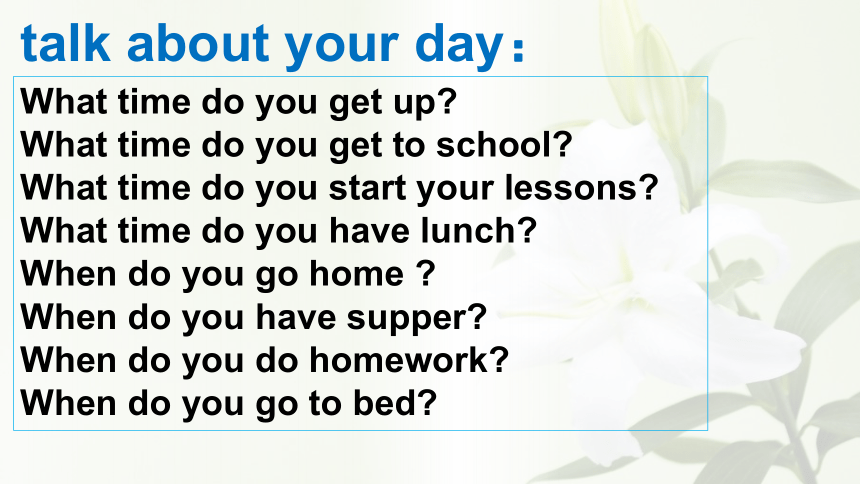
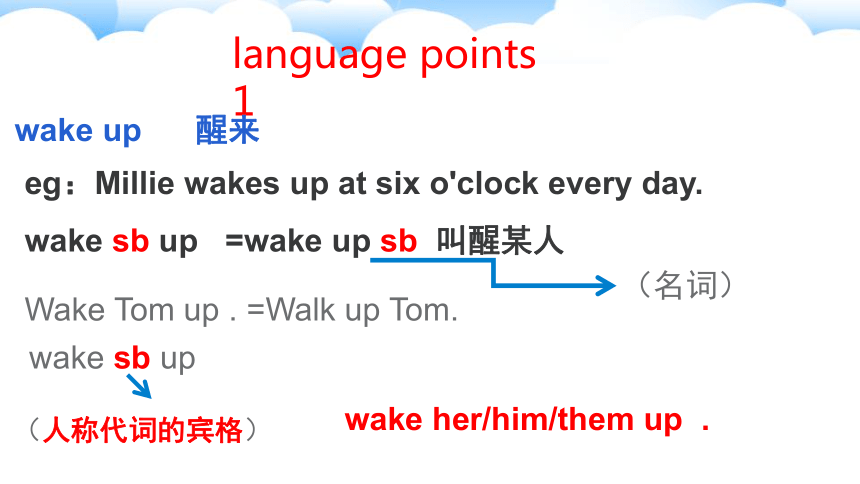
文档简介
Unit 4 My day
Talk about the time
整点:钟点数 o'clock
half past
past
分钟数>30
表达式:
分钟数past 点钟数
10:20
twenty past ten
to
分钟数≤30
表达式:
(60-分钟数)to下一点钟数
2:50
ten to three
Let's do it
LOREM IPSUM DOLOR
6:10 ten past six six ten
7:30 half past seven seven thirty
8:45 a quarter(fifteen) to nine
eigth forty-five
15:50 ten to four
9:15 a quarter past nine
10:00 ten o'clock
Eddie's day
Does Eddie love sleeping?
wake up
have breakfast
go to sleep
have lunch
have a good rest
= go to sleep
It is time for sth
It is time to do sth
该是做什么事的时候了
It is time for sb to do sth
该是某人做某事的时候了
Millie's day
6:30 a.m.
get up
She gets up at 6:30 a.m.
It is time to get up.
It is time for her to get up.
Millie's day
7:00 a.m.
have/eat breakfast
She has/eats up at 6:30 a.m.
It is time to have breakfast.
It is time for her to have breakfast.
Read by yourselves loudly.放开声音大声读
起床 get up
好好休息一下 have a good rest
吃早/午/晚 饭 have breakfast/lunch/supper(dinner)
上课 have lessons
做早操 do morning exercises
做课外活动 do after-school activites
做家庭作业 do homework
看电视 watch TV
看书 read books
talk about your day:
What time do you get up?
What time do you get to school?
What time do you start your lessons?
What time do you have lunch?
When do you go home ?
When do you have supper?
When do you do homework?
When do you go to bed?
language points 1
wake up 醒来
eg:Millie wakes up at six o'clock every day.
wake sb up =wake up sb 叫醒某人
Wake Tom up . =Walk up Tom.
(名词)
wake sb up
wake her/him/them up .
(人称代词的宾格)
language points 2
做某事怎么样? 的表达法
Shall we do sth?
Let's do sth,shall we?
What about doing sth?
做早操怎么样?
Let's do morning exercises,shall we?
Shall we do morning exercises ?
What about doing morning exercises?
need sth
need to do sth
need a watch
need a good sleep
need to have a good rest
need to clean the classroom
need to buy a book
doesn't
don't
need :需要 行为动词
language points 3
疑问词+ to do 的用法
1.I don't know how there. (get)
2.Please tell me where lunch. (eat)
4.I don't know which bus . (take)
3.Can you tell me when a Chinese lesson. (have)
to get
to eat
to have
to take
language points 4
language points 5
seldom 很少
never 从不
频率副词,
通常位于行为动词之前,助动词和be动词之后。
never
seldom
sometimes
often
(从不)
(很少)
(有时)
(经常)
usually
always
(通常)
(总是)
1 他总是六点钟起床。
2 我上学从不迟到。
3 我们不经常去看电影。
He always gets up at six.
I am never late for school.
Wo don't often go to the cinema.
(1)exercise 可数名词,意为“操练、练习”,常用复数形式。
Usually we do morning exercises first.
(1)
(2)
做眼保健操 do eye exercises
language points 6
(2)first 副词,意为“首先”,前面不加任何定冠词。
放学后,我总是先完成我的家庭作业。
After school,I always finish my homework first.
拓展:first 作为序数词,意为“第一”。
比如:Sunday is the first day of a week.
作限定词时,前面要加定冠词the,但前面有形容词性物主代词等修饰可省略the
This is my first plane trip.
Children in China start school at 6 years old.
language points 7
at 6 years old 意为“在6岁时”,相当于 at the age of 6
询问年龄的句型?
How old are you?
after school 放学以后
after-school 课外的,课后的
have fun 玩的很开心
have a great time
have a good time
Put them into English
1.该上课了。
2.11:45分了,该吃午饭了。
3. 过的开心。
4.我不知道如何回答这个问题。
It is time to have lessons.
It is a quarter to twelve,it is time to have lunch.
Have a good time .
I don't know how to answer this question.
Unit 4 My day
Gramma
I usually go to school at 7:20.
我们可以在不同的时间前面使用in,on,at来表达做某事的时间。
介词 用于 举例
in 一天中的早、中晚
月份
季节
年 in the morning /afternoon/evening
in January/Febuary/March/April...
in spring/summer/autumn/winterin
in 2017...
on 星期
某一天
某一天的早、中、晚
特定的节日(一天) on Sunday/Monday/Tuesday...
on 1September
on a cold morning/sunday afternoon
on Chindren's Day
at 某一时刻(具体时间)
年龄 at 4:30
at 12 years old
注意:节日时间不止一天,而是连续一段时间,则用介词at。
如:at Christmas、at Spring Festival.
用恰当的介词填空
1.We go to school Monday Friday.
2.Mike spends 20 yuan the CD.
3. dinner,I sometimes have an orange or a banana.
4.Judy does some reading the morning.
5. Monday morning,he listens to English on the radio.
from
to
on
After
in
On
6.-Do you know Mo Yan?
- Of course.He won the 2012 Nobel Prize for Literature the age of 57.
7.A terrible earthquake hit Ya'an the morning of April 25.
8 She goes to shop a cold winter morning.
9.My sister gets up early morning and goes to bed late night.
at
on
on
in
at
Thank you
Talk about the time
整点:钟点数 o'clock
half past
past
分钟数>30
表达式:
分钟数past 点钟数
10:20
twenty past ten
to
分钟数≤30
表达式:
(60-分钟数)to下一点钟数
2:50
ten to three
Let's do it
LOREM IPSUM DOLOR
6:10 ten past six six ten
7:30 half past seven seven thirty
8:45 a quarter(fifteen) to nine
eigth forty-five
15:50 ten to four
9:15 a quarter past nine
10:00 ten o'clock
Eddie's day
Does Eddie love sleeping?
wake up
have breakfast
go to sleep
have lunch
have a good rest
= go to sleep
It is time for sth
It is time to do sth
该是做什么事的时候了
It is time for sb to do sth
该是某人做某事的时候了
Millie's day
6:30 a.m.
get up
She gets up at 6:30 a.m.
It is time to get up.
It is time for her to get up.
Millie's day
7:00 a.m.
have/eat breakfast
She has/eats up at 6:30 a.m.
It is time to have breakfast.
It is time for her to have breakfast.
Read by yourselves loudly.放开声音大声读
起床 get up
好好休息一下 have a good rest
吃早/午/晚 饭 have breakfast/lunch/supper(dinner)
上课 have lessons
做早操 do morning exercises
做课外活动 do after-school activites
做家庭作业 do homework
看电视 watch TV
看书 read books
talk about your day:
What time do you get up?
What time do you get to school?
What time do you start your lessons?
What time do you have lunch?
When do you go home ?
When do you have supper?
When do you do homework?
When do you go to bed?
language points 1
wake up 醒来
eg:Millie wakes up at six o'clock every day.
wake sb up =wake up sb 叫醒某人
Wake Tom up . =Walk up Tom.
(名词)
wake sb up
wake her/him/them up .
(人称代词的宾格)
language points 2
做某事怎么样? 的表达法
Shall we do sth?
Let's do sth,shall we?
What about doing sth?
做早操怎么样?
Let's do morning exercises,shall we?
Shall we do morning exercises ?
What about doing morning exercises?
need sth
need to do sth
need a watch
need a good sleep
need to have a good rest
need to clean the classroom
need to buy a book
doesn't
don't
need :需要 行为动词
language points 3
疑问词+ to do 的用法
1.I don't know how there. (get)
2.Please tell me where lunch. (eat)
4.I don't know which bus . (take)
3.Can you tell me when a Chinese lesson. (have)
to get
to eat
to have
to take
language points 4
language points 5
seldom 很少
never 从不
频率副词,
通常位于行为动词之前,助动词和be动词之后。
never
seldom
sometimes
often
(从不)
(很少)
(有时)
(经常)
usually
always
(通常)
(总是)
1 他总是六点钟起床。
2 我上学从不迟到。
3 我们不经常去看电影。
He always gets up at six.
I am never late for school.
Wo don't often go to the cinema.
(1)exercise 可数名词,意为“操练、练习”,常用复数形式。
Usually we do morning exercises first.
(1)
(2)
做眼保健操 do eye exercises
language points 6
(2)first 副词,意为“首先”,前面不加任何定冠词。
放学后,我总是先完成我的家庭作业。
After school,I always finish my homework first.
拓展:first 作为序数词,意为“第一”。
比如:Sunday is the first day of a week.
作限定词时,前面要加定冠词the,但前面有形容词性物主代词等修饰可省略the
This is my first plane trip.
Children in China start school at 6 years old.
language points 7
at 6 years old 意为“在6岁时”,相当于 at the age of 6
询问年龄的句型?
How old are you?
after school 放学以后
after-school 课外的,课后的
have fun 玩的很开心
have a great time
have a good time
Put them into English
1.该上课了。
2.11:45分了,该吃午饭了。
3. 过的开心。
4.我不知道如何回答这个问题。
It is time to have lessons.
It is a quarter to twelve,it is time to have lunch.
Have a good time .
I don't know how to answer this question.
Unit 4 My day
Gramma
I usually go to school at 7:20.
我们可以在不同的时间前面使用in,on,at来表达做某事的时间。
介词 用于 举例
in 一天中的早、中晚
月份
季节
年 in the morning /afternoon/evening
in January/Febuary/March/April...
in spring/summer/autumn/winterin
in 2017...
on 星期
某一天
某一天的早、中、晚
特定的节日(一天) on Sunday/Monday/Tuesday...
on 1September
on a cold morning/sunday afternoon
on Chindren's Day
at 某一时刻(具体时间)
年龄 at 4:30
at 12 years old
注意:节日时间不止一天,而是连续一段时间,则用介词at。
如:at Christmas、at Spring Festival.
用恰当的介词填空
1.We go to school Monday Friday.
2.Mike spends 20 yuan the CD.
3. dinner,I sometimes have an orange or a banana.
4.Judy does some reading the morning.
5. Monday morning,he listens to English on the radio.
from
to
on
After
in
On
6.-Do you know Mo Yan?
- Of course.He won the 2012 Nobel Prize for Literature the age of 57.
7.A terrible earthquake hit Ya'an the morning of April 25.
8 She goes to shop a cold winter morning.
9.My sister gets up early morning and goes to bed late night.
at
on
on
in
at
Thank you
同课章节目录
- 预备课程
- Lesson 1 Nice to meet you !
- Lesson 2 A happy family
- Lesson 3 A nice school
- Lesson 4 You look cool !
- Lesson 5 Wonderful things
- Lesson 6 Have nice food
- Lesson 7 Enjoy our days
- Lesson 8 Let's have fun !
- Unit 1 This is me
- Unit 2 Let's play sports
- Unit 3 Welcome to our school
- Unit 4 My day
- Unit 5 Let’s celebrate
- Unit 6 Food and lifestyle
- Unit 7 Shopping
- Unit 8 Fashion
